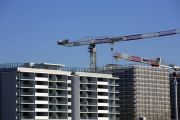
Property pay moderates as companies tighten their belts
Average pay rises in the property sector moderated for the second time this year, as companies sought to balance cost-of-living pressures felt by staff while keeping their own spending in check.
Wages in the sector rose 4.3 per cent on average for the year to September, a survey this month of 1700 property companies spanning investment, construction, design, services and consultancy by remuneration firm Avdiev Report found. This was down from a 4.7 per cent bump in March and a 5 per cent increase a year ago.

As inflation eases and with interest rates expected to fall, property wage rises are set to moderate even further, with the latest Avdiev Report forecasting a 3.5 per cent median increase next year.
Avdiev Report principal Debra Moloney said the moderation in pay rises reflected a “cautious approach to ensuring sustainability in the face of ongoing economic pressures”.
“Managing remuneration budgets has emerged as the top remuneration issue for property companies,” Ms Moloney said.
“With cost-of-living pressures driving salary expectations, businesses are facing a delicate balancing act.”
Ms Moloney said the pullback in pay rises was part of efforts to push the rest of companies’ operations back to profitability – 40 per cent of companies surveyed by Avdiev said they had made strategic changes to their operating model to increase services and reduce costs.
“We’ve been approached by quite a few real estate agency businesses to undertake reviews for them around the structure of their pay packages, [which typically] have low fixed pay and high commissions,” Ms Moloney said.
Given cost-of-living pressures – almost a third of companies surveyed by Avdiev said they were under more pressure to increase pay for this reason – Ms Moloney said some real estate agencies were considering boosting agents’ fixed base pay.
But with a third of property firms facing recruitment challenges, according to the survey, there are still hefty pay rises on offer for some talented professionals such as those working in asset management.
Barry Cawthorn, managing director at Bawdens agency in Parramatta, western Sydney, said its top-performing asset managers, who managed properties valued at between $4 million and $40 million, had received annual pay rises of 12 per cent to 16 per cent.
“These people were earning $100,000 [and] are now earning $130,000,” Mr Cawthorn said.
“We pay these wages to retain and attract the best people and to remain leaders in the industry.”
But, he said, sales staff were getting nothing like the wage increases offered to asset managers. “They’re getting half that at best, 6 to 7 per cent,” he said.
Rent rise fuels wage bump
In the residential sector, Ray White disclosed that on average, sales agents had earned $202,300 in FY24, up 6.5 per cent on the previous financial year (in line with Avdiev figures).
However, property managers had enjoyed a 12.4 per cent average bump in pay to $83,205 in FY24 on the back of a surge in residential rents.
“Sales agents are impacted by the gross commission income they write and the percentage they receive split with the business,” said Luke Richardson, director of accounting solutions at Ray White.
“Property managers’ [salaries] are far more fixed in nature. However, the rental increases have allowed businesses to pass on the majority of this benefit to staff in order to retain staff,” he said.
Looking to next year, 60 per cent of the property companies surveyed by Avdiev expect little to no change in operating conditions.
A third said the business outlook over the next 12 months was “better”. Fund managers were the most optimistic, followed by design and building consultants and property developers.











